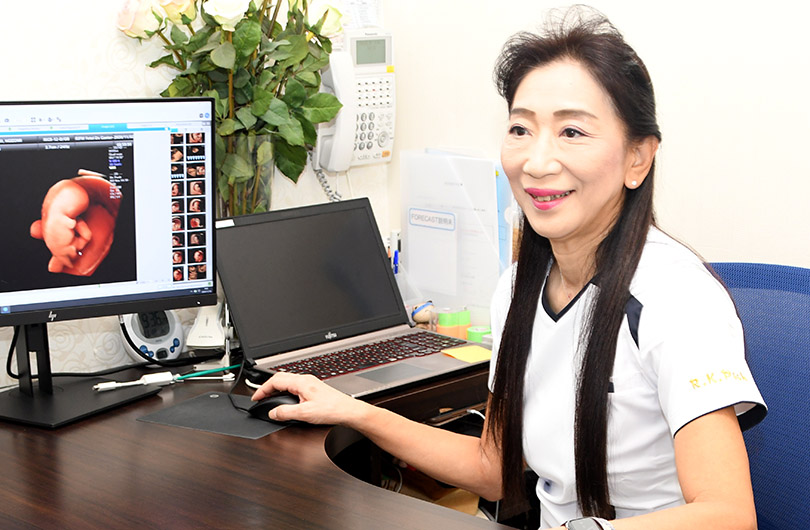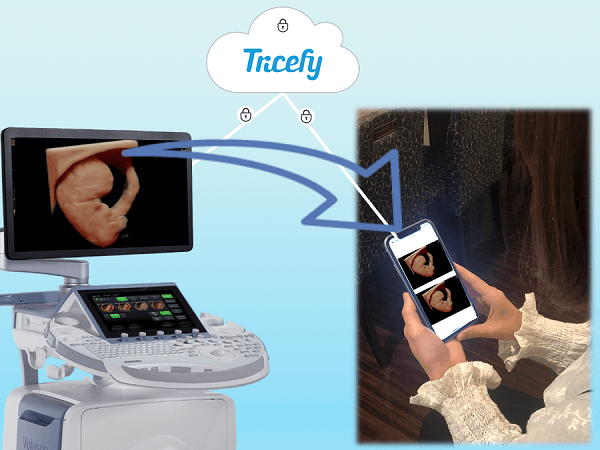Elderly mom outpatient
- TOP
- Our Services and
- Elderly mom outpatient
Elderly mom outpatient To those who have been told they have an older pregnancy or childbirth

According to the World Health Organization (WHO), giving birth at the age of 35 or older is considered an older childbirth (an older pregnancy). In today's society, where more and more women are entering the workforce and marrying later in life, older childbirth is not particularly uncommon. However, it is said that older pregnancies are more likely to result in the birth of a fetus with chromosomal abnormalities, genetic abnormalities, or Down's syndrome due to the aging of the egg, as well as a higher risk of developing gestational hypertension and other complications. NIPT is another option.
One option is to consider NIPT, but many people have doubts about doing a blood test on the mother without examining the fetus.
In CRIFM, many of us take the fetal Dock first and then decide whether to take NIPT, Oscar test, or CVS.
Many people come to CRIFM after they have had NIPT and come out "negative" and end up having the CVS, so why don't you meet the fetus "Fetus First" and then decide which test to have?
If you are over 35 years old and are worried about pregnancy and childbirth, please come to CRIFM from the beginning of your pregnancy to get early reassurance or to take time to face the fetus in your belly.
CRIFM's Guide to Prenatal Diagnosis for Moms Over 35
As mothers age, they have more concerns about their fetus.
At CRIFM, we offer fetal Dock, which is a detailed examination of the health of the fetus.
CRIFM's fetal Dock is to carefully examine the baby's face, limbs, and other physical features for any abnormalities using precision ultrasound.
The results of the fetal Dock can be provided on the same day, so there is no need to wait anxiously for weeks after the examination.
At Elderly mom outpatient, we ask mothers to undergo fetal Dock first, and only when abnormalities are found in the baby, we suggest CVS / Amniocentesis to confirm the diagnosis. *The CVS / Amniocentesis is not mandatory.
If you have any concerns about your fetus, please contact CRIFM. We provide prompt and accurate diagnosis and support the "best" choice for mothers and fathers.
Basic examination items
fetal Dock
In fetal Dock, the fetus is checked for developmental problems in the 1st (11-13th weeks), 2nd (18-21st weeks) and 3rd (29-30th weeks) trimesters.
In the 1st trimester, chromosomal abnormalities as well as congenital anomalies such as nuchal translucency and position of the limbs are checked. The detection rate of chromosomal abnormalities is higher than that of 2nd trimester, so it is especially important to check for these in older pregnancies.
In the 2nd trimester, the development of the face, organs, joints, and other parts of the body are observed, and if any abnormalities are suspected, a more detailed examination is performed.
In the 3rd trimester, the areas observed in the 2nd trimester are double-checked, and the wrinkle formation in the brain that develops after the middle of pregnancy is observed. The development of the cerebral cortex, which controls human intellectual activities, is also checked.
Flow of the fetal Dock test
Please make an appointment for the fetal Dock test by phone or using the appointment form when you are in the 9th or 10th week and the due date is expected. On the day of your appointment, you will need to fill out a medical questionnaire, so please be sure to come to the hospital 15 minutes before your appointment time.
After measuring your weight and blood pressure, if there are no problems, an ultrasound examination will be performed in a private room. The image will be displayed on a monitor so that you and your child can check it together.
After the ultrasound and internal examination, you will be asked to wait for a while after the examination. Each item will be explained again in the private room.
Fees for fetal Dock tests
| Basic examination (per fetus) |
41,800 yen (including tax) *The basic fee for late stage fetal Dock for those who have undergone 2nd trimester is 22,000 yen (tax included). |
|---|---|
| Detailed examination fee (per fetus) |
5,500 - 44,000 yen (including tax) After the basic examination, the fee will be added to the basic fee if necessary. |
| Results counseling | 3,850~22,000 yen (including tax) |
When chromosome examination is necessary
If the fetal Dock ultrasound shows that there is a possibility of chromosomal abnormalities, the CVS / Amniocentesis will be performed to confirm the diagnosis.
11-14 weeks gestation (15-17 weeks is also possible): CVS
We perform the CVS at 11-14 weeks (also available at 15-17 weeks) of pregnancy. A small amount of superficial anesthesia is used, which has little effect on the fetus. After anesthesia, a needle is inserted into the abdomen to collect the villi.
It takes about a minute from the time of disinfection to the end of the test, and the actual villi collection takes 10-15 seconds.
The chorionic villus sampling is performed while checking the inside of the uterus with a high-performance ultrasound.
Through our experience of 14,000 cases, we have done everything possible to ensure that the CVS can be performed safely with minimal risk.
After the CVS, you will be allowed to rest for 15-20 minutes and then go home after an ultrasound examination to confirm that the fetus is healthy.
CVS fee
| CVS (rapid trisomy test [QF-PCR test], chromosome karyotyping, microchromosome aberration test [D-karyo]) |
218,900 yen (tax included) *DNA extraction fee: 16,500 yen (tax included) |
|---|---|
| SNPmicroarray test *Optional test |
110,000 yen (including tax) |
| Whole Exome Sequencing *Optional test |
418,000 yen (tax included) |
| Special FISH test *Optional test |
49,500 yen (including tax) |
*In addition to the above, additional fees such as Medical Information Form: 8,800 yen (including tax) may be required.
After 16 weeks of pregnancy: Amniocentesis
We offer an Amniocentesis for women who are 16 weeks pregnant or older. Amniotic fluid is collected from the mother's uterus, and the amniotic fluid is checked for chromosomal and genetic abnormalities.
In CRIFM, the transabdominal ultrasound is used to check the inside of the uterus, and the test is performed safely so as not to harm the fetus.
CRIFM does not use surface anesthesia for the Amniocentesis because it uses a very thin special needle for fetal use.
After the Amniocentesis, you will be allowed to rest for about 20 minutes, and then go home after the ultrasound examination to check the health of the fetus.
Fees for Amniocentesis
| Amniocentesis (rapid trisomy test [QF-PCR test], chromosome karyotyping, microchromosome aberration test [D-karyo]) |
185,900 yen (tax included) *DNA extraction fee: 16,500 yen (tax included) |
|---|---|
| SNPmicroarray test *Optional test |
110,000 yen (including tax) |
| Whole Exome Sequencing *Optional test |
418,000 yen (tax included) |
| Special FISH test *Optional test |
49,500 yen (including tax) |
*Additional fees such as Medical Information Form: 8,800 yen (including tax) may be required.
Ultrasound images can be viewed on medical imaging cloud services.

We use Tricefy, a medical imaging cloud service,which allows us to share ultrasound images of the fetus directly with the mother's smartphone.
Of course, the images can be stored on the cloud with thorough security, so the lovely images of the baby can be viewed anytime, anywhere, from any device.
For those of you who are wondering whether to see an Elderly pregnancy mom outpatient
CRIFM's precision ultrasound fetal Dock is a combination of genetic ultrasound (to determine the probability of Down's syndrome, etc.) and morphological diagnosis (nowadays, quite a few congenital malformations are diagnosed early on).
Therefore, strictly speaking, ultrasonography is not only a screening test, but also a diagnostic test in a sense. It also includes a screening test for gestational hypertension, which is a very serious problem in older pregnancies.
Prenatal diagnosis is the beginning of CRIFM Care
At CRIFM, we believe that prenatal diagnosis is not the goal, but the beginning.
If we find any abnormality in your baby, we will explain the condition of your baby based on objective and accurate imaging diagnosis. We will provide you with the latest information on the clinical course and treatment of each disease, which is advancing day by day, and we will discuss with mother and father what preparations they can make for their baby.
CRIFM also provides consultation services for mothers and fathers who are unsure whether to continue their pregnancy or are worried about their ability to continue their pregnancy.
CRIFM does not deliver babies or provide treatment, but we will refer you to an appropriate medical institution based on the condition of the baby and the wishes of the mother and father.
The entire staff at CRIFM will support mothers and fathers in dealing with their babies until the end of their lives.
If you have any concerns about your baby, why don't you check the health of your baby with Dr. Pooh. Please feel free to call us first.
Medical Appointments
All appointments are by appointment only. Appointments can be made by phone (until the end of the clinic) or by using the "Appointment Form" on our website, so please feel free to make an appointment. Please remember to bring a letter of introduction written by the doctor who take care of you, health insurance card, and maternal and child health handbook with you when you come to the clinic. If you do not have a letter of introduction, you will need to pay an additional fee of 5,500 yen (tax included).
Currently, in order to prevent COVID-19 infection, only mothers are allowed to visit the clinic. Dads and other family members are asked to wait in the "Family Kizuna Lounge".
